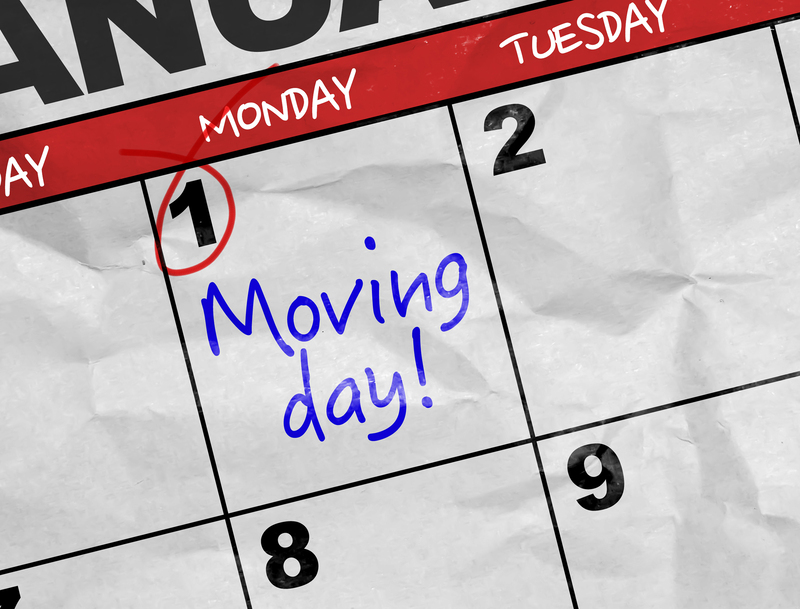Ensure a Calm and Organized House Move
Posted on 07/06/2025
Ensure a Calm and Organized House Move: The Ultimate Step-by-Step Guide
Moving house is often cited as one of the most stressful life events. But with the right strategies, you can ensure a calm and organized house move that leaves you feeling excited and stress-free. This comprehensive guide walks you through the entire moving process, equipping you with essential tips, checklists, and insights to make your transition seamless. Whether you're moving across town or the country, you'll find actionable steps to guarantee a smooth relocation.
Why Is a Calm and Organized House Move Important?
Maintaining order and minimizing stress during your move has many benefits. It preserves your peace of mind, helps you avoid lost or damaged items, and ensures that you transition smoothly into your new home. An organized house move allows you to:
- Save time and money by reducing last-minute costs and confusion.
- Prevent loss or damage to cherished belongings.
- Reduce anxiety and increase family harmony during a time of change.
- Enjoy your new space sooner, without unnecessary delays or clutter.

How to Ensure a Calm House Move: Planning Ahead
1. Start Early With a Timeline
Avoid the pitfalls of a chaotic move by starting as early as possible. Creating a detailed timeline keeps you on track and allows you to organize your house move with minimal stress.
- Eight Weeks Before: Research moving companies, gather quotes, or arrange a rental truck if DIY.
- Six Weeks Before: Begin decluttering and make a list of items to sell, donate, or discard.
- Four Weeks Before: Start packing non-essentials and notify schools, doctors, and service providers about your upcoming move.
- Two Weeks Before: Confirm all logistics, change your address, and arrange utilities for the new house.
- Moving Week: Pack essential items and keep valuables and important documents accessible.
2. Declutter for a Stress-Free Move
Decluttering makes packing easier and can significantly reduce moving stress. Before you box up your life, assess everything you own. Ask yourself:
- Have I used this in the last year?
- Does this item hold sentimental or practical value?
- Could someone else benefit from this more?
Hold a garage sale, donate to charity, or safely dispose of broken or obsolete items. Fewer items mean fewer boxes, less time, and a calmer moving day.
Packing Tips for an Organized House Move
3. Gather Quality Packing Materials
Make your life easier by assembling all the supplies you need beforehand. You'll need:
- Sturdy boxes in various sizes
- Packing tape and dispensers
- Bubble wrap or packing paper
- Markers for labeling
- Scissors and utility knives
- Specialty boxes for fragile items, artwork, and clothing
4. Pack Efficiently and Label Clearly
Pack one room at a time and clearly label each box with its contents and destination room in the new house. Consider color-coding or numbering boxes. This will help streamline the unpacking process and keep your house move organized.
- Use small boxes for heavy items and large boxes for lighter items to prevent breakage.
- Fill empty spaces with packing material to protect belongings.
- List essential items separately and keep a "first night" box for quick access.
Tip: Photograph the contents of each box before sealing them. In case a label falls off, your phone will help you identify what's inside.
House Relocation: Moving Day Strategies for Calmness
5. Communicate with Your Movers
If you're using professional movers, establish clear communication. Share your schedule, special instructions for fragile or valuable items, and contact details. If friends or family are helping, assign specific roles so everyone knows what to expect.
- Confirm the moving date and time at least two days before.
- Provide a clear parking plan for moving trucks or helpers.
- List out "must-move" items (essentials and breakables) to avoid oversight.
6. Keep Essentials Accessible
Pack a dedicated essentials box or bag for moving day. Having immediate access to crucial items ensures a calm moving day and prevents unnecessary panic searching among dozens of boxes. Include:
- Toiletries and basic cleaning supplies
- Chargers and key electronics
- Medications and important documents
- Fresh bedding and a change of clothes
- Snacks and water
- Children's or pet essentials
7. Take Breaks and Care for Yourself
Staying calm during a house move is easier when you maintain energy and morale. Don't hesitate to take short breaks, eat healthy meals, and delegate when possible. A well-rested mindset prevents mistakes and friction during a high-stress day.
- Play soothing music or a favorite podcast for entertainment and relaxation.
- Stay hydrated and keep healthy snacks on hand.
- Thank your helpers and keep spirits high with small rewards (like pizza or treats).
Settling In: Maintaining Organization After the Move
8. Room-by-Room Unpacking Plan
Once you've arrived, resist the urge to open boxes at random. Instead, stick to your plan to keep your house move organized all the way through.
- Start with essential rooms: Set up your bedroom, kitchen, and bathroom first.
- Unpack gradually: Break the process into manageable sessions to avoid feeling overwhelmed.
- Recycle packing materials as you go to maintain a clutter-free space.
Arrange furniture and set up major appliances before dealing with smaller decor or non-essentials.
9. Familiarize Yourself with the Neighborhood
Part of a stress-free house move is quickly settling into your new surroundings. Take a walk, introduce yourself to neighbors, and locate key places like grocery stores, pharmacies, and hospitals. This not only helps you feel at home but also settles any lingering anxiety from the transition.
10. Reflect and Celebrate
After your organized move, take time to celebrate your achievement. Host a small "housewarming" for family or friends, or simply relax and enjoy your new space. Share lessons learned and make notes for future reference--each move gets easier with experience!
Bonus Tips for a Stress-Free and Organized House Move
Moving with Pets and Kids
Moving with children or animals adds layers of complexity, but planning ahead ensures smooth sailing for everyone involved. Involve kids in packing, maintain routines, and keep favorite toys or comfort objects handy.
- Arrange sitters for pets or children on moving day when possible.
- Pack a "comfort kit" for quick access to snacks, games, or familiar items.
- Talk about the move and answer questions to ease worries and foster excitement.
Minimize Environmental Impact
- Use recycled boxes and eco-friendly packing supplies.
- Recycle or donate items to avoid filling landfills.
- Reduce car trips by consolidating errands and carpooling when possible.
Stay Connected and Organized Digitally
Utilize technology for an even calmer moving experience:
- Keep digital copies of moving checklists and inventories.
- Take photos of cable setups for easy reinstallation.
- Download local maps and utility apps for your new neighborhood.

Common Mistakes to Avoid for an Organized Move
Even the best-laid plans can go astray. Watch for these pitfalls:
- Leaving packing until the last minute: Leads to rushed packing and mislabeling.
- Failing to notify relevant parties of your address change: Causes mail and billing issues.
- Overpacking boxes: Risks injury and breakage.
- Ignoring self-care or help offers: Increases stress and exhaustion.
Learning how to ensure a calm and organized house move involves anticipating these errors and building in extra time and resources where possible.
Conclusion: Your Pathway to a Calm, Organized Move
Moving house signals a fresh start--but only if you manage it well. With our proven strategies and tips, you're ready to ensure your next house move is as peaceful and organized as possible. Remember to plan ahead, ask for help, and cherish the excitement of a new beginning. By following these actionable steps, you will unlock a stress-free house moving process and settle into your new home with confidence and calm!
Start your journey to a happier, more organized move--one box at a time!
```Latest Posts
Creating a Spotless Enviroment Before Departing
How Not to Relocate Your Piano: The Case for Professionals
Tackle Your Next Move: Bed and Mattress Moving Hacks



